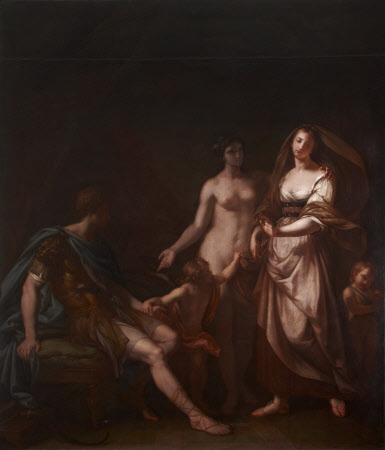Venus ushering Helen to Paris
Gavin Hamilton (Murdiestone House, Lanark 1723 - Rome 1798)
Category
Art / Oil paintings
Date
1756 - 1759
Materials
Oil on canvas
Measurements
2438 x 3048 mm (96 x 120 in)
Place of origin
Rome
Order this imageCollection
Kedleston Hall, Derbyshire
NT 110004
Caption
This painting by the neo-classical Scottish artist living in Rome, Gavin Hamilton, was commissioned by Nathaniel Curzon, 1st Lord Scarsdale (1726-1804) for £200 in 1756 and finished three years later. As related in the epic Greek poem of the Iliad by Homer, Venus, accompanied by Cupid, is bringing Helen to Paris. The son of the king of Troy remains seated. It depicts a scene after the famous competition when Paris was asked by the god Mercury to judge which was the fairest goddess of them all. The winner, Venus, is introducing him to the most beautiful woman in the world, Helen, wife of Menelaus, King of Sparta as his prize. Although at this moment she is looking rather coy and reluctant, Helen, in fact, quickly falls in love with Paris and willingly elopes to Troy with him, thus beginning a war.
Summary
Oil painting on canvas, Venus ushering Helen to Paris by Gavin Hamilton (Murdiestone House, Lanark 1723 - Rome 1798), 1756-59. Paris, full-length, seated on left, turned to right, profile, his right leg outstretched, dressed in Roman tunic, armour, cloak and sandals, supporting himself with his right hand on the edge of his stool, his left hand being taken by a naked child (Cupid?) who stands between him and Helen; the child looks up at Helen, and gestures towards her with his left hand, behind and slightly to the right of him is a naked female (Venus), head turned three-quarters to right, gazing at Helen, gesturing with her right hand towards Paris; Helen on right, full-length, turned three-quarters to left, her head turned to spectator, but inclined slightly to the right, looking down, her weight on her right sandalled foot, holds her gown with her right hand and gestures a refusal with her left hand; dressed in semi-classical gown with a veil over her head. Paris, the son of Priam, king of Troy, was told by Hermes (Mercury) on the command of Zeus (Jupiter) that he was to choose which goddess was fairest by presenting to her a golden apple inscribed ‘for the fairest’; the apple had been thrown down by Eris (Strife) at the wedding of Peleus and Thetis. Each of the three goddesses, Hera (Juno), Athena (Minerva) and Aphrodite (Venus) offered him bribes, the first, domination over the earth, the second, victory in battle and the third, the most beautiful woman in the world. Paris chose the last. Paris was sent on a deputation to Menelaus, King of Sparta, who was married to Helen, reputedly the most beautiful woman in the world and the daughter of Zeus, who had made love to her mother Leda in the form of a swan. Helen, at first reluctant but responding to Aphrodite's (Venus) outrage: 'Damn you woman, don't provoke me - I'll get angry and let you drop! I'll come to hate you as terribly as I now love you!' (Homers's Iliad 3, 414-415), and on this impulse sent to her by Aphrodite falls in love with Paris. When Menelaus left Sparta to bury his grandfather Catreus in Crete, Paris and Helen eloped to Troy taking with them much of Menelaus’s treasure. Thus began the Trojan war.
Provenance
Commissioned by Nathaniel Curzon, 1st Lord Scarsdale (1726-1804) in 1756 and finished three years later for £200;and thence by descent until bought with part of the contents of Kedleston with the aid of the National Heritage Memorial Fund in 1987 when the house and park were given to the National Trust by Francis Curzon, 3rd Viscount Scarsdale (1924-2000)
Credit line
Kedleston Hall, The Scarsdale Collection (acquired with the help of the National Heritage Memorial Fund and transferred to the National Trust in 1987)
Makers and roles
Gavin Hamilton (Murdiestone House, Lanark 1723 - Rome 1798) , artist
References
Harris 1978 Leslie Harris, 'The Picture Collection at Kedleston Hall', The Connoisseur, July 1978, vol.198, no.79, pp. 208- 218 , pp.208-18, p. 208:
